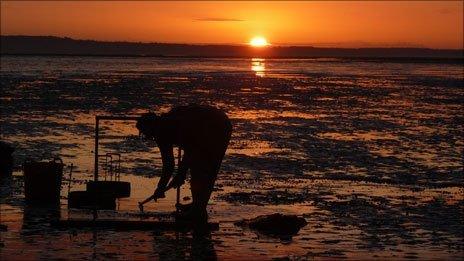Mussels dredged to save Dee Estuary cockles
- Published

About 1,000 tonnes of mussels are being removed from Dee sand banks
Mussels on the Dee Estuary are to be dredged in order to save local cockle beds, and boost the mussel population off Anglesey.
About 1,000 tonnes of mussels, covering an area of 100 football pitches, have established on the estuary off Greenfield dock, Flintshire.
But large numbers of mussels can smother and kill cockles.
Dredging work, lasting a week, starts on Monday. The mussels will be placed in the Menai Strait to boost stocks.
Two dredgers from Bangor Mussel Producers Ltd will clear the bed with the aim of saving the cockles and preserving future stocks.
'Delicate balance'
The mussels will be taken to beds in the Menai Strait - which separates the island of Anglesey from the Gwynedd mainland - and used as seed for harvesting in 12 to 18 months.
A sustainable cockle fishery was established by Environment Agency Wales (EAW) in the Dee Estuary in 2009, and 50 fishermen are issued with licences each year.
EAW area manager David Edwell said: "Managing the shellfish industry is a complicated business, partly because it involves trying to maintain the delicate balance of nature in the area.
"In this instance we are able to give the cockle and mussel industries in north Wales a boost which is great for the economy and for wildlife.
"It's the first time we've done this - we'll be keeping a close eye to make sure it works."
Local fisherman are keen for the shellfish to be separated, saying there is more demand for cockles.
- Published10 August 2011
- Published26 May 2010
- Published22 March 2011